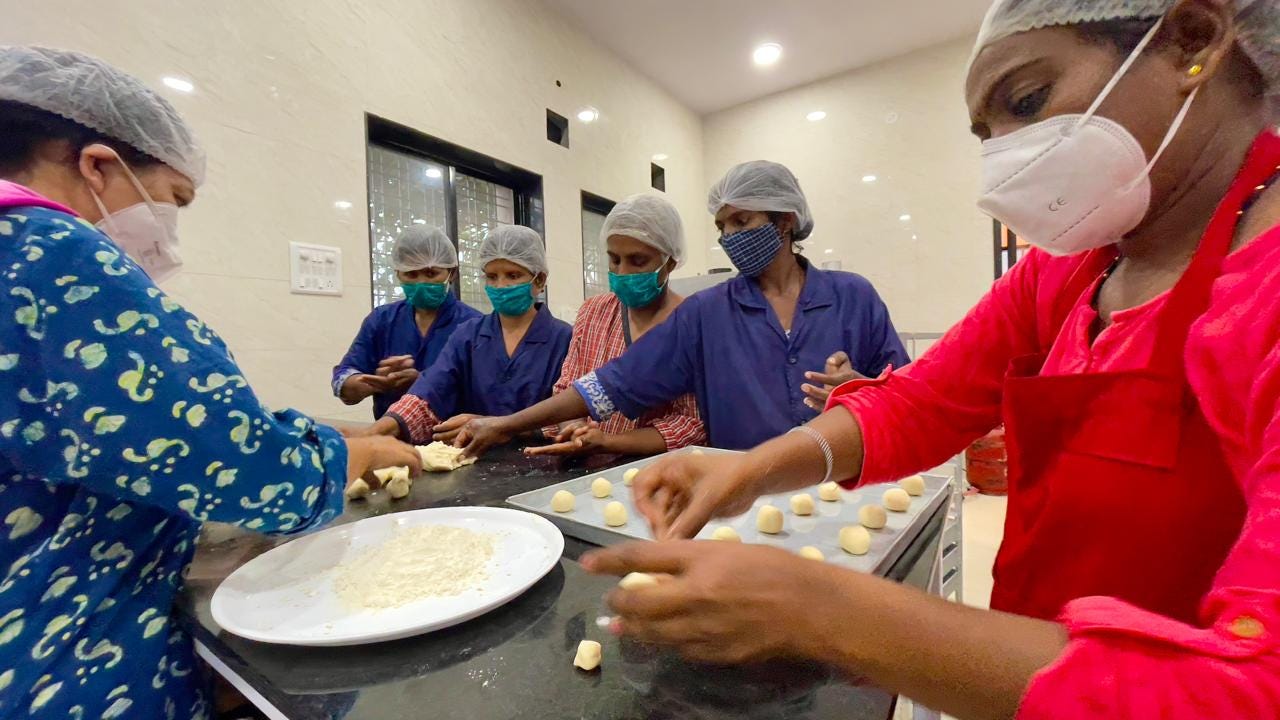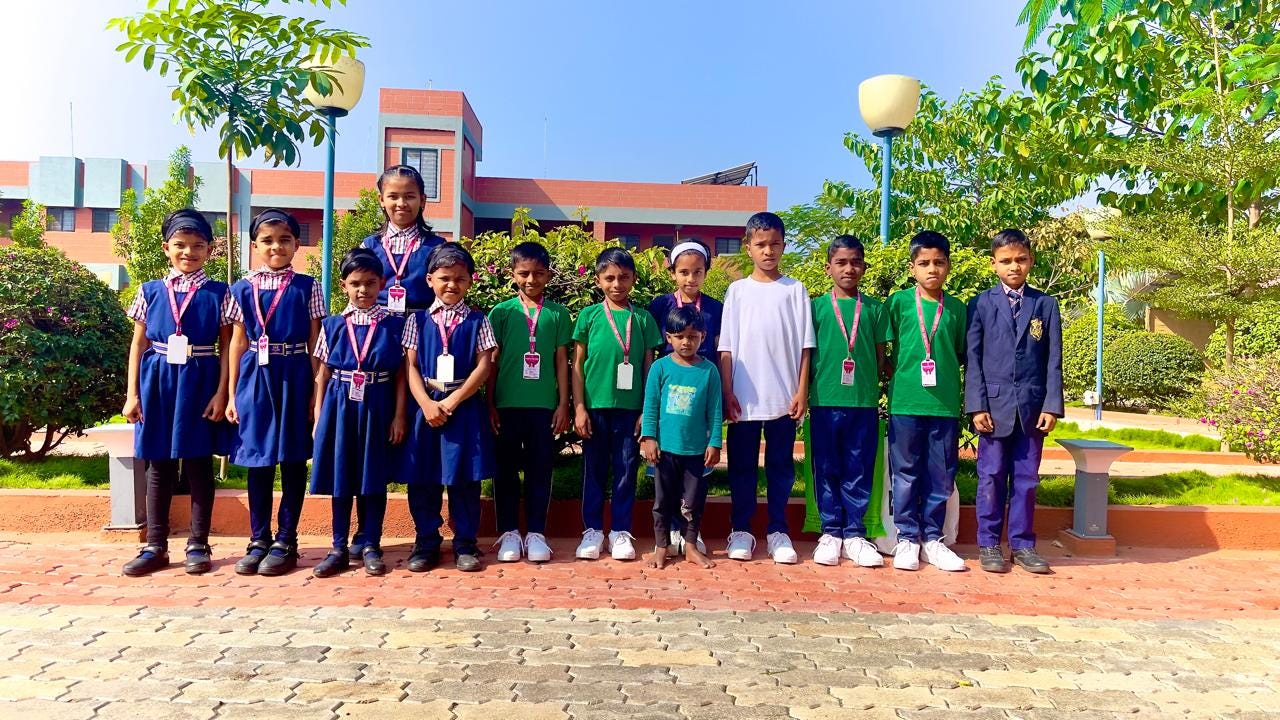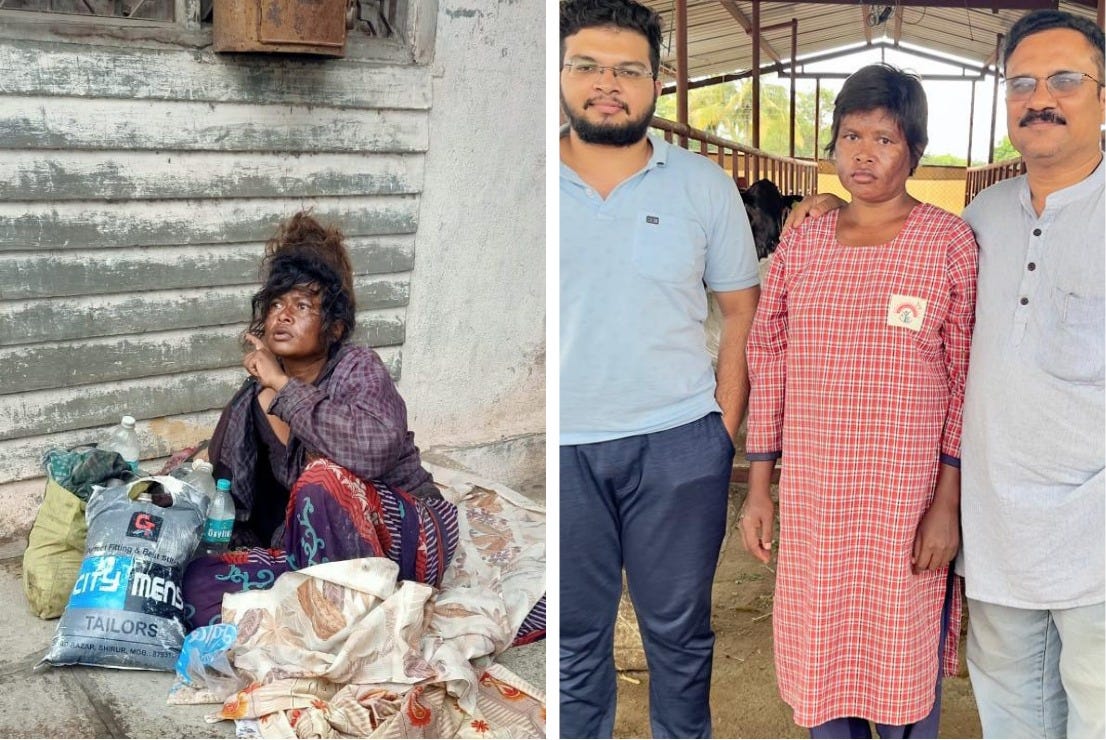Meet the doctor couple providing lifelong care to homeless and mentally ill women
For over two decades, Mauli Seva Pratishthan in Ahmednagar, Maharashtra, founded by Drs. Sucheta and Rajendra Dhamane, has helped homeless, mentally ill women regain dignity and self-reliance.
Snapshot
In 1998, a moment of compassion sparked a movement. Dr. Sucheta Dhamane and her husband, Dr. Rajendra Dhamane, were on their way to work when they encountered a mentally ill woman sitting on a pile of garbage, desperately hungry and neglected. Moved by her plight, they began preparing and distributing meals daily, but they soon realized that food alone wasn’t enough. These women needed safety, care, and a place to call home.
Determined to make a difference, the couple founded Mauli Seva Pratishthan. What began with providing food quickly grew into something much larger. Another encounter, this time with a young woman who had been sleeping on a road divider for safety, was a stark reminder of how vulnerable these women were. With no one to turn to and no place to stay, the exposed divider, despite the dangers, felt like the safest option. This wasn’t an isolated case. The more they worked, the more they uncovered heartbreaking stories of women—some highly educated—now abandoned due to mental illness or social stigma.
Realizing that sporadic help wasn’t enough, the Dhamanes dedicated themselves full-time to building Mauli Seva Pratishthan—a place where women and their children could not only survive but thrive. Today, Mauli is a lifeline for 475 women and 40 children, providing them with safety, care, and empowerment through self-sustaining projects like organic farming, baking, and dairy.
For a detailed account of their journey, read the full story in the Dive Deeper section.
Impact at a glance
Caring for Lives: Home to 475 women and 40 children, providing rescue, rehabilitation, and lifelong care for homeless, mentally ill women and children.
Facilities: 3-acre Mangaav center for mental health and rehabilitation.
Self-Sustaining Initiatives: Organic farming, dairy, bakery, and goat farming for rehabilitation and empowerment.
Global Recognition: Winner of Rotary's The One International Humanitarian Award in 2016, Hong Kong, for the outstanding social work.
R&D: International collaboration on mental health research with a women-led team of neuroscientists in Switzerland.
Future Plans: Establishment of a 300-bed charitable hospital and expansion of mental health research lab.
Funding Needs: ₹20 lakh per month with no institutional support.
Dive Deeper: Full Story (6 mins read)
In 1998, Dr. Sucheta and Dr. Rajendra Dhamane embarked on a journey that would change the lives of hundreds of women and children. The turning point came during a seemingly ordinary day when the couple encountered a mentally ill woman sitting amidst garbage, neglected and starving. “We were both on our way to work when we saw her,” Dr. Sucheta recalls in an interview with ImpactStories.in. “She was sitting near a drainage area, completely disheveled, without any clothes, and she was eating her own waste. I couldn’t believe what I was seeing.”
The sight haunted them. As doctors, they had witnessed human suffering before, but this level of abandonment was shocking. The woman was so hungry that she had resorted to eating what little was around her, and she was drinking drainage water to survive. "She was in such a desperate state," Dr. Sucheta explains, "her mind was so broken that she didn’t even recognize the danger of her situation." They tried to give her food, but she couldn’t eat properly—it had been too long since she had consumed anything nutritious.
Even after they left to fulfill their professional duties, the memory of that woman stayed with them. "I couldn't focus at work," Dr. Sucheta says. "We both felt like we had to do something, but we didn’t know what." That evening, they began their mission, preparing meals and driving around the streets to distribute them. This initiative, called the Annapurna Project, became a daily commitment. “Every day, before heading to work, we packed 40-50 meals and distributed them to people in need,” Dr. Rajendra shares. But as time passed, they realized food was only a temporary fix for a much deeper problem.
The Beginning of Mauli Seva Pratishthan
The couple’s growing involvement with homeless women reached another turning point when they met a young woman who had been living on the streets for days. She had nothing and was completely alone when they found her. "She told us she always slept on a road divider because it was the only place she felt safe," Dr. Sucheta recounts. The idea that a road divider—exposed to traffic and the elements—felt safer than any other option hit them hard. "That’s when it clicked—we couldn’t just feed these women. They needed a home, protection, and care."
This incident, combined with the heartbreaking scene they had witnessed earlier, solidified their decision to do more. Soon after, the couple received 6,000 square feet of land from Dr. Rajendra’s father, and Mauli Seva Pratishthan (MSP) was born. The organization grew from the idea that these women, many of whom were mentally ill and abandoned, deserved lifelong care.
Akka: The First Resident of Mauli Seva Pratishthan
One of the earliest and most poignant cases at Mauli Seva Pratishthan was Akka, an elderly woman who had been sitting at the Nagar-Pune Highway chowk for over four years. No matter the weather—scorching heat or monsoons—Akka never left her spot.
Determined to give Akka the care she deserved, Drs. Sucheta and Rajendra Dhamane decided she would become the first resident of Mauli Seva Pratishthan. One day, during the monsoon, they went to bring her to the shelter, but Akka refused. After several attempts, they finally managed to convince her to come to Mauli.
When they asked her why she had stayed at the chowk for so long, they learned her heartbreaking story. Years ago, her mother and brother had abandoned her there. Her brother had asked her to sit at that spot, saying he would bring her tea, but he never returned. Akka remained at the chowk for four years, believing that if she left, her brother would never find her again.
Akka lived at Mauli for several years, but her years on the streets had taken a severe toll on her health. One night, she became critically ill. Despite rushing her to the hospital, they were turned away, and by the time they returned, Akka had passed away. Her death was a painful moment, but it strengthened the Dhamanes' resolve to ensure that no other woman would die alone and uncared for on the streets.
A Lifelong Mission
Mauli Seva Pratishthan isn’t just a shelter—it’s a place where women can reclaim their dignity and rebuild their lives. Over the years, the Dhamanes have introduced numerous self-sustaining projects, including organic farming, goat farming, dairy, and a bakery, to help these women regain a sense of self-reliance.
"Mauli is not a temporary shelter," Dr. Rajendra explains. "It is a lifelong care, treatment, and rehabilitation home for destitute, homeless, mentally and physically ill women, and their children—many of whom were born as a result of rapes on the streets. Here, both women and their children can rebuild their lives with dignity, hope, and purpose."
In addition to providing essential care, Mauli helps its residents and their children thrive. One girl, the child of an abandoned and homeless woman who is also at Mauli, is now studying physiotherapy, while another, with a similar story, recently gained admission into a B.Sc. Nursing program. These success stories reflect Mauli’s larger mission—not just to house people, but to empower them to build meaningful futures.
"Mauli is not a temporary shelter. It is a lifelong care, treatment, and rehabilitation home for destitute, homeless, mentally and physically ill women, and their children—many of whom were born as a result of rapes on the streets. Here, both women and their children can rebuild their lives with dignity, hope, and purpose." - Dr Rajendra Dhamane
Challenges and Growth
Starting Mauli came with its own set of challenges. In its early days, MSP struggled to gain trust. People misunderstood their mission, spreading rumors and questioning their motives. “Some even thought we were taking mentally unstable women to remove their kidneys,” Dr. Rajendra recalls. Despite the skepticism, the Dhamanes pushed forward. "We received critical support from community members like Bapat Kaka and Sane Kaka, who provided early financial contributions that allowed Mauli to grow."
In 2015, Mauli expanded its efforts with the Mangaav project, a 3-acre facility gifted by renowned Natya Kalakar like Abaji, Balbhim, and Meghmala Tai Pathare. This facility, named Mangaav, is dedicated to supporting individuals who have lost both their minds (mann) and homes (gaav). The development of this center allowed Mauli to reach even more women in need, ensuring their work would continue for years to come.
This photo captures the transformation of a woman from a destitute state to one of dignity and self-reliance, showcasing the profound impact of Mauli’s lifelong care.
Reflecting on Mauli’s journey, Dr. Sucheta expresses her deep gratitude for the countless individuals who have helped the organization achieve so many milestones. “There are so many people who have supported us along the way, far too many to name. I am completely indebted to all of them for their help and support in this journey.”
International Impact and Recognition
Mauli Seva Pratishthan’s incredible contributions have not gone unnoticed. In 2016, the organization was honored with The One International Humanitarian Award by Rotary in Hong Kong, recognizing its outstanding work in empowering marginalized women and children.
Additionally, through a connection made by SBI chairman Arundhati Bhattacharya, Mauli was introduced to a team of neuroscientist women in Switzerland. This collaboration focuses on pioneering mental health research, particularly in studying gender differences in treatment, with the goal of preventing mental health issues before they fully manifest.
Looking Forward
As Mauli Seva Pratishthan moves into the future, the challenges remain significant, particularly in securing regular funding. The organization’s monthly expenses total ₹20 lakhs, with no government or institutional support. Despite the financial strain, the Dhamanes remain committed to their vision—expanding their mental health research lab and establishing a 300-bed charitable hospital to provide surgeries for the poorest of the poor.
“Mauli is more than a home,” Dr. Sucheta says. “It’s a promise that no woman will be left on the streets to suffer, that every child will have a future, and that we can build a better, kinder world together.”
This is the story of Mauli Seva Pratishthan—a story of compassion, resilience, and a lifelong commitment to restoring dignity and hope to society’s most vulnerable.
Make an Impact
Mauli Seva Pratishthan continues to uplift the lives of hundreds of women and children, but the journey is far from over. You can play a part in this life-changing mission:
Website: Learn more about Mauli Seva Pratishthan at www.msp.org.in.
Donate: Help cover monthly expenses for food, shelter, medical care, and education.
Volunteer: Offer your time and skills to support the women and children at Mauli.
Visit: Experience the impact firsthand by visiting Mauli. Click here for location.
Contact: Start a WhatsApp conversation with Dr. Rajendra Dhamane.
Spread the Word: Share this article to raise awareness and inspire others to make a difference.
Message from the Founder
If this story resonated with you and you appreciate my efforts in bringing such inspiring stories to light, I would be truly grateful for your support. Your contribution will help me continue uncovering and sharing real stories that are driving change across India.
Sincerely,
Abhilash Shah
ImpactStories
Join thousands of subscribers and get exclusive, uplifting stories of people making a difference—delivered straight to your inbox!
We promise not to spam you—just inspiring content.











